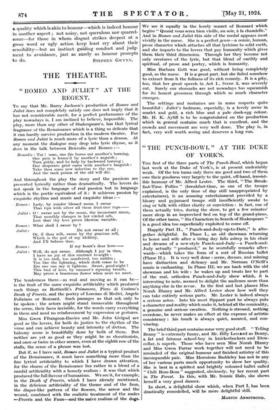THE THEATRE.
"ROMEO AND JULIET" AT THE RECI-ENT.
To say that Mr. Barry Jackson's production of -Romeo and Juliet does not completely satisfy one does not imply that it 'hat not considerable merit, for a perfect performance of the play nowadays is, I am inclined to believe, impossible. The - play, more than any other of Shakespeare's, hat that lyrical fragrance of the Renaissance which is a thing -so delicate that it can hardly survive production in the modern theatre. For Romeo and Juliet is much more of a lyric than a drama. At any moment the dialogue may drop into lyric rhyme, as it does in the talk • between Benvolio and Romeo :— Benvolio : Tut man, one fire burns out another's burning, One pain is lessen'd by another's anguish ; Turn giddy, and be-holp by backward turning ; One desperate grief' cures with another's -languish: Take thou some new infection to thy eye, And the 'rank poison of the old will die.
And throughout the play the story and the passions are presented lyrically rather than dramatically. The lovers do
not speak in the language of real passion but in language which is the poetic equivalent of it : it achieves passion by exquisite rhythm and music and exquisite ideas
Romeo : Lady, by yonder blessed_ moon I 'swear That tips with -silver all these fruit-tree tops— Juliet : 0' swear not by the moon, the inconstant moon, That monthly changes in her circled -orb, Lest that thy love prove likewise -variable.
Romeo : What shall I swear by ?
Do not swear at all ;
Or, if thou wilt, swear by thy gracious self, Which is the god of my idolatry, And I'll believe thee.
If my heart's dear love— Well, do not swear. Although I joy in thee, I have no joy of this contract to-night : It is too rash, too unadvised, too sudden ; Too like the lightning, which doth cease to be Ere one can say it lightens. Sweet, good-night ! This bud of love, by summer's ripening breath, May prove a beauteous floWer when next -we meet.
The tenderness there—as real and moving as it can be— is the fruit of the same exquisite artificiality which produced
such things as Botticelli's Primavera, Piero di Cosimo's Death of Procris, and the poetry of Lorenzo di Medici, Angelo
Poliziano or Ronsard. Such passages as that ask only to be spoken : the actors might stand immovable throughout the scene, their faces invisible, for the words carry everything in them and need no reinforcement by expression or gestures.
Miss Gwen Ffrangcon-Davies and Mr. John Gielgud are good as the lovers, for both do justice to the rhythm of the verse and can achieve beauty and intensity of diction. The balcony scene is beautifully done by both of them. But neither are yet as good as they might be as elocutionists, and once or twice in other scenes, even at the eighth row of the stalls, the sense of a phrase was lost.
But if, as I have said, Romeo and Juliet is a typical product of the Renaissance, it must have something more than the
fine lyrical artificiality to which I have drawn attention, for the charm of the Renaissance lies rather in a blend of a candid artificiality with a homely realism : it was that which produced the full flavour of humanism. We see it, for example,
in the Death of Procris, which / have already mentioned, in the delicious artificiality of the theme and of the faun, the diaper-like pattern of the flowers, the arrow and the 'wound, cOmbined with the realistic treatment of the nudes —Procris and the Faun—and the naive realism of the dogs.
Juliet : Romeo : Juliet :
We see it equally in the lovely sonnet of Ronsard which begins" Quand vous serez bien vieillei au soir, it la chandelle." And in Romeo and.Juliet this side of the medal appears -most vividly in the nurse. She is a perfect genre—a comic, human, prose character which attaches all that lyricism to solid earth, and she imparts to the lovers that gay humanity which gives them their third 'dimension. Through her they become- not only creatures of the lyric, but that blend of earthly and spiritual, of prose and poetry, which is humanity.
Miss Barbara Gott 4vas• good, without being completely good, as the nurse. It is a great part; but she failed somehow to extract from it the fullness-Of its rich comedy. It is a pity, too, that her great speech. in .Act I., Scene -3, was severely cut. Surely, our stomachs are not nowadays too squeamish for its honest grossness through which so much character emerges.
The settings and costumes are in some respects quite beautiful : Juliet's -bedroom, especially, is a lovely scene in scarlet and gold, a rich blue 'and a pale. duck-egg colour. Mr. H. K. Ayliff is to be congratulated on the production which in general contains much that is excellent, and the crowds -and movement are very 'well done. The play is, in fact, very -well worth seeing and deserves a long run.










































 Previous page
Previous page